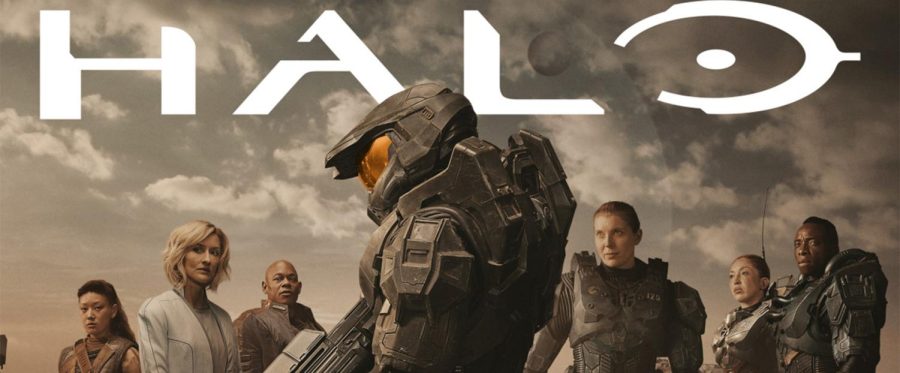Halo’s mediocre premiere leaves the show infinitely reaching for success
March 30, 2022
This article contains spoilers for Halo, streamable on Paramount+.
The hit video game franchise Halo premiered its long-awaited live action show adaptation of the same name on March 24. By now, video game players know that video game shows and movies tend to fail in delivering an accurate telling of their source material. While Halo falls in this category, the show itself still has plenty of great moments, leaving viewers simultaneously wanting to see more yet hesitant on the showrunner’s direction.
Halo’s concept was a clear break from the storyline of the games. In plenty of show and book adaptations in the past, the franchise stayed within the continuity of the original lore. Unsurprisingly, fans were taken aback by the sudden decision to make the new live-action television show take place in an alternate universe.
Mimicry permeates Halo’s plot with heavy reliance on the popularity of the concept of The Mandalorian. The protagonist and franchise hero, Master Chief, barely behaves as his video game counterpart with exception to his brute strength and analytical thinking. In no way should this criticism be applied to the man behind the helmet, Pablo Schreiber, but rather the writers who attempted to give audiences a version of Master Chief similar to Disney’s Mandalorian.
That being said, the writers handle the rest of the episode well, showcasing the discourse between the UNSC and the world expertly as well as the UNSC’s inner workings. Halo’s first episode shines brightest when Master Chief slowly becomes deviant and works independent of the UNSC’s orders. While a drastic shift from the character of the games, this doesn’t necessarily weaken the construction of the writer’s version of the beloved Spartan. Given that this is only the first episode, the plot has potential to expand and take on a life of its own. However, as of episode one, originality doesn’t seem to be a priority.
One thing that works is Halo’s casting and strong characters — both new ones and fan favorites. Every actor gives it their all, leaving viewers with the impression that the writers meticulously crafted each character.
Schreiber plays an excellent Master Chief. Although he is different from the games, his behavior is intriguing, mysterious and calculated. In episode one, viewers follow Master Chief after he touches a foreign artifact that elicits memories of his childhood which the UNSC took from him when making him into their supersoldier. There is a clear emotional arc that Master Chief takes, but he leaves enough confusion and mystery for the audience.
Another fantastic element is Halo’s action sequences, which dominate the first 10 minutes of the show. Master Chief fights off aliens, the Covenant, in a fusion of brutality and beauty. With first-person perspectives and thousands of explosions, the action feels like a non-stop thrill ride. At one point, even the fan-favorite energy sword makes an appearance.
Halo is far from a perfect video game adaptation, let alone a television masterpiece, but that doesn’t make it bad. Its narrative has potential to stand on its own despite the rocky start. Only time will tell whether it fails or succeeds. Fans and non-fans alike will find enjoyment in Halo, but won’t walk away claiming it as the best show ever made.
Despite its flaws, Halo does what any form of media should do at the minimum: entertain.
3 ½ energy swords out of 5



